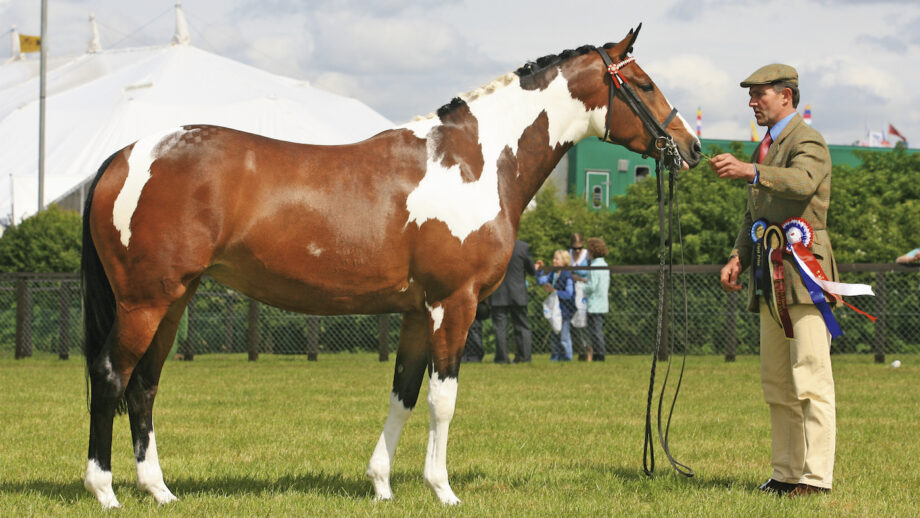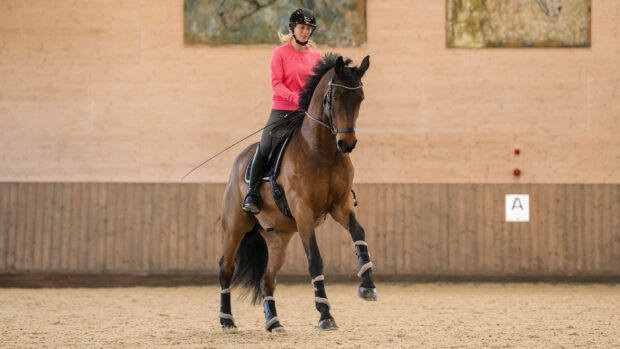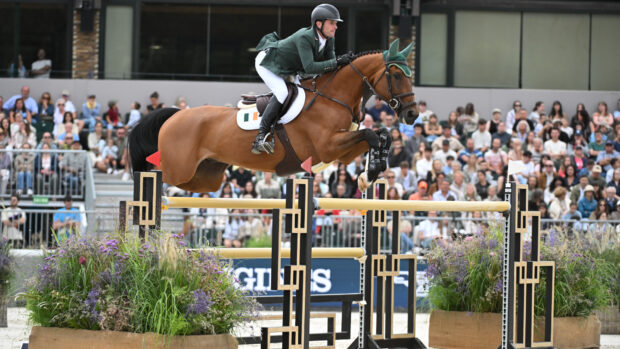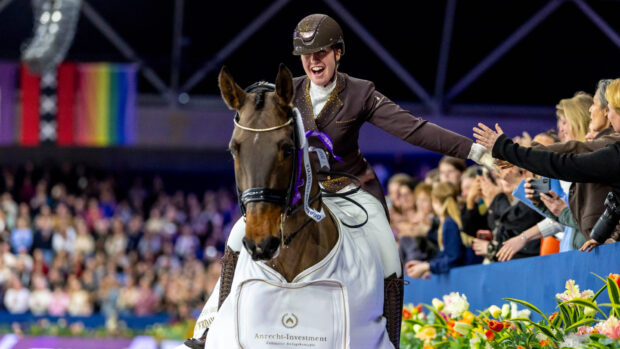The winter break offers a much-needed rest for both horse and rider, but as the New Year rolls in, so does the responsibility of getting your show horse fit and ready for the season ahead. For many, this process can feel like balancing on a knife’s edge – progress too quickly, and the risk of injury looms; progress too slowly, and you may struggle to meet your goals.
Rebuilding fitness requires a methodical approach. Walking forms the foundation, but when should you introduce trotting, canter, or hill work? What about the controversial topic of roadwork – should it remain a staple of conditioning programmes, or is it an outdated practice? Here, we’ll unpack these questions, explore the essential steps to take, and share insights from top professionals on best practices for bringing horses back to work.
Laying the foundation for getting a show horse fit: the walking phase
Walking may seem mundane, but it’s an essential first step in any fitness regime. This phase helps restore muscle tone, improve joint health, and engage core muscles, all while minimising strain on tendons and ligaments. For horses that have enjoyed a holiday turnout period, walking also provides a mental reset, allowing them to settle back into the rhythm of work.
The golden rule when planning a walking programme is to dedicate at least half the duration of the horse’s time off to this phase. For example, if a horse has had six weeks off, aim for three weeks of walking under saddle or in-hand before progressing to faster work. This calculated approach reduces the risk of soft tissue injuries and builds a solid base for the next stages.
Producer Vicky Smith believes six weeks of hacking is the best start to the season.
{"content":"PHA+4oCcT25jZSB0aGV54oCZdmUgaGFkIHRoZWlyIGhvbGlkYXksIEkgdHJlYXQgZWFjaCBob3JzZSBsaWtlIGEgYmxhbmsgY2FudmFzLiBTaXggd2Vla3Mgb2YgaGFja2luZyBvbiB0aGUgcm9hZCBpcyB2aXRhbCB0byBzbG93bHkgaW50cm9kdWNlIHRoZW0gdG8gd29yay4gSeKAmWQgZ2l2ZSB0aGVtIGEgYmliIGNsaXAgYW5kIHRoZW4sIGFmdGVyIGEgd2VlaywgaGF2ZSBzaG9lcyBwdXQgYmFjayBvbi4gT25jZSB3ZeKAmXZlIGhhZCB0aGUgZnVsbCBNT1Qgb24gZWFjaCBob3JzZSDigJQgYmFja3MsIHRlZXRoLCBhbmQgc2FkZGxlIGFsbCBjaGVja2VkIOKAlCB3ZSBpbmNyZWFzZSB0aGUgd29ya2xvYWQgc2xvd2x5LuKAnTwvcD4KPGRpdiBpZD0iYXR0YWNobWVudF84ODE2NTAiIHN0eWxlPSJ3aWR0aDogMTQxMHB4IiBjbGFzcz0id3AtY2FwdGlvbiBhbGlnbm5vbmUiPjxpbWcgZmV0Y2hwcmlvcml0eT0iaGlnaCIgZGVjb2Rpbmc9ImFzeW5jIiBhcmlhLWRlc2NyaWJlZGJ5PSJjYXB0aW9uLWF0dGFjaG1lbnQtODgxNjUwIiBjbGFzcz0ibGF6eWxvYWQgYmx1ci11cCBzaXplLWZ1bGwgd3AtaW1hZ2UtODgxNjUwIiBkYXRhLXByb2Nlc3NlZCBzcmM9Imh0dHBzOi8va2V5YXNzZXRzLnRpbWVpbmN1ay5uZXQvaW5zcGlyZXdwL2xpdmUvd3AtY29udGVudC91cGxvYWRzL3NpdGVzLzE0LzIwMTcvMDMvbmV3LWhoLXBsYWNlaG9sZGVyLTIwMHgyMDAucG5nIiBkYXRhLXNyYz0iaHR0cHM6Ly9rZXlhc3NldHMudGltZWluY3VrLm5ldC9pbnNwaXJld3AvbGl2ZS93cC1jb250ZW50L3VwbG9hZHMvc2l0ZXMvMTQvMjAyNS8wMS8yQVRYSDBKLmpwZyIgYWx0PSJCbGFjayBob3JzZSB3aXRoIGEgYmliIGNsaXAiIHdpZHRoPSIxNDAwIiBoZWlnaHQ9Ijk1OSIgZGF0YS1zaXplcz0iYXV0byIgZGF0YS1zcmNzZXQ9Imh0dHBzOi8va2V5YXNzZXRzLnRpbWVpbmN1ay5uZXQvaW5zcGlyZXdwL2xpdmUvd3AtY29udGVudC91cGxvYWRzL3NpdGVzLzE0LzIwMjUvMDEvMkFUWEgwSi5qcGcgMTQwMHcsIGh0dHBzOi8va2V5YXNzZXRzLnRpbWVpbmN1ay5uZXQvaW5zcGlyZXdwL2xpdmUvd3AtY29udGVudC91cGxvYWRzL3NpdGVzLzE0LzIwMjUvMDEvMkFUWEgwSi0yOTJ4MjAwLmpwZyAyOTJ3LCBodHRwczovL2tleWFzc2V0cy50aW1laW5jdWsubmV0L2luc3BpcmV3cC9saXZlL3dwLWNvbnRlbnQvdXBsb2Fkcy9zaXRlcy8xNC8yMDI1LzAxLzJBVFhIMEotNTg0eDQwMC5qcGcgNTg0dywgaHR0cHM6Ly9rZXlhc3NldHMudGltZWluY3VrLm5ldC9pbnNwaXJld3AvbGl2ZS93cC1jb250ZW50L3VwbG9hZHMvc2l0ZXMvMTQvMjAyNS8wMS8yQVRYSDBKLTEzNXg5Mi5qcGcgMTM1dywgaHR0cHM6Ly9rZXlhc3NldHMudGltZWluY3VrLm5ldC9pbnNwaXJld3AvbGl2ZS93cC1jb250ZW50L3VwbG9hZHMvc2l0ZXMvMTQvMjAyNS8wMS8yQVRYSDBKLTMyMHgyMTkuanBnIDMyMHcsIGh0dHBzOi8va2V5YXNzZXRzLnRpbWVpbmN1ay5uZXQvaW5zcGlyZXdwL2xpdmUvd3AtY29udGVudC91cGxvYWRzL3NpdGVzLzE0LzIwMjUvMDEvMkFUWEgwSi02MjB4NDI1LmpwZyA2MjB3LCBodHRwczovL2tleWFzc2V0cy50aW1laW5jdWsubmV0L2luc3BpcmV3cC9saXZlL3dwLWNvbnRlbnQvdXBsb2Fkcy9zaXRlcy8xNC8yMDI1LzAxLzJBVFhIMEotOTIweDYzMC5qcGcgOTIwdywgaHR0cHM6Ly9rZXlhc3NldHMudGltZWluY3VrLm5ldC9pbnNwaXJld3AvbGl2ZS93cC1jb250ZW50L3VwbG9hZHMvc2l0ZXMvMTQvMjAyNS8wMS8yQVRYSDBKLTEyMjB4ODM2LmpwZyAxMjIwdyIgc2l6ZXM9IihtYXgtd2lkdGg6IDE0MDBweCkgMTAwdncsIDE0MDBweCIgLz48cCBpZD0iY2FwdGlvbi1hdHRhY2htZW50LTg4MTY1MCIgY2xhc3M9IndwLWNhcHRpb24tdGV4dCI+QSBiaWIgY2xpcCBpcyBpZGVhbCBpbml0aWFsbHkgYXMgeW91IGdyYWR1YWxseSBzdGVwIHVwIHlvdXIgaG9yc2XigJlzIHdvcmtsb2FkLiBDcmVkaXQ6IE5pZ2VsIEJha2VyL0FsYW15PC9wPjwvZGl2Pgo8aDM+SG93IHRvIHN0cnVjdHVyZSB0aGUgd2Fsa2luZyBwaGFzZTwvaDM+Cjx1bD4KPGxpPldlZWsgMTogYmVnaW4gd2l0aCAyMCBtaW51dGVzIG9mIHdhbGtpbmcgcGVyIHNlc3Npb24sIHN0aWNraW5nIHRvIGZsYXQgZ3JvdW5kIGFuZCBzdHJhaWdodCBsaW5lcy4gR3JhZHVhbGx5IGV4dGVuZCB0aGUgZHVyYXRpb24gYnkgZml2ZSBtaW51dGVzIGV2ZXJ5IGZldyBkYXlzLjwvbGk+CjxsaT5XZWVrIDI6IGluY3JlYXNlIHNlc3Npb25zIHRvIDMw4oCTNDAgbWludXRlcy4gSW50cm9kdWNlIGNoYW5nZXMgaW4gdGVycmFpbiwgc3VjaCBhcyBnZW50bGUgaW5jbGluZXMgb3IgdW5ldmVuIHN1cmZhY2VzLCB0byBhY3RpdmF0ZSBzdGFiaWxpc2luZyBtdXNjbGVzLjwvbGk+CjxsaT5XZWVrIDM6IEJ1aWxkIHVwIHRvIDUw4oCTNjAgbWludXRlcywgYWRkaW5nIGJhc2ljIGxhdGVyYWwgd29yayBsaWtlIGxlZy15aWVsZGluZyB0byBlbmhhbmNlIHN1cHBsZW5lc3MgYW5kIGNvb3JkaW5hdGlvbi48L2xpPgo8L3VsPgoKPHA+V2Fsa2luZyBpcyBhbHNvIGFuIGV4Y2VsbGVudCBvcHBvcnR1bml0eSB0byBvYnNlcnZlIHlvdXIgaG9yc2UgY2xvc2VseS4gQXJlIHRoZXkgbW92aW5nIGV2ZW5seT8gRG8gdGhleSBzZWVtIGNvbWZvcnRhYmxlIHVuZGVyIHNhZGRsZT8gRWFybHkgZGV0ZWN0aW9uIG9mIGFueSBzdGlmZm5lc3Mgb3IgaW1iYWxhbmNlIGNhbiBwcmV2ZW50IHNldGJhY2tzIGxhdGVyLjwvcD4KPHA+QW5pbWFsIGNoaXJvcHJhY3RvciBMdWN5IFdpbGxpcyBGbGVtaW5nIHJlaW5mb3JjZXMgaG93IGltcG9ydGFudCB0aGlzIHN0YWdlIGlzOiDigJxBIGdvb2QsIGVuZXJnZXRpYyB3YWxrIGhhcyBtYW55IGJlbmVmaXRzLiBXaGVuIGV2ZXJ5IGxpbWIgaXMgZW5nYWdlZCwgaXTigJlzIHRoZSBnb2xkIHN0YW5kYXJkIGluIGZpdG5lc3MuIFdoZW4gSSBzYXkgd2FsaywgSSBtZWFuIGVuZ2FnZWQgYW5kIG1hcmNoaW5nIG91dCwgbm90IHNsb3BwaW5nIGFsb25nIG9uIGEgbG9vc2UgcmVpbiB3aGlsZSB5b3XigJlyZSBvbiB5b3VyIHBob25lLiBJdOKAmXMgYSByZWFsbHkgdXNlZnVsIGNhcmRpb3Zhc2N1bGFyIHdvcmtvdXQgd2hpbGUgZ2l2aW5nIGdlbnRsZSBjb25jdXNzaXZlIHN0aW11bGF0aW9uIHRvIHRoZSBib2R5LuKAnTwvcD4KCjxoMz5UaGUgcm9hZHdvcmsgZGViYXRlOiBvdXRkYXRlZCBvciBlc3NlbnRpYWw\/PC9oMz4KPHA+Um9hZHdvcmsgaGFzIGxvbmcgYmVlbiBhIGNvcm5lcnN0b25lIG9mIHRyYWRpdGlvbmFsIGZpdG5lc3MgcmVnaW1lcywgdmFsdWVkIGZvciBpdHMgYWJpbGl0eSB0byBwcmVwYXJlIHRlbmRvbnMgYW5kIGxpZ2FtZW50cyBmb3IgbW9yZSBzdHJlbnVvdXMgd29yayB0aHJvdWdoIHN0ZWFkeSBleGVyY2lzZSBvbiBhIGNvbnNpc3RlbnQgbGV2ZWwgc3VyZmFjZS4gSG93ZXZlciwgaXRzIHBsYWNlIGluIG1vZGVybiBjb25kaXRpb25pbmcgaXMgaW5jcmVhc2luZ2x5IGRlYmF0ZWQuIFNvbWUgdmV0cyB3YXJuIG9mIHRoZSBwb3RlbnRpYWwgZm9yIHJlcGV0aXRpdmUgc3RyYWluIGluanVyaWVzIGNhdXNlZCBieSBwcm9sb25nZWQgd29yayBvbiBoYXJkIHN1cmZhY2VzLCB3aGlsZSBvdGhlcnMgYXJndWUgdGhhdCBzaG9ydCwgY29udHJvbGxlZCBzZXNzaW9ucyByZW1haW4gYmVuZWZpY2lhbC48L3A+CjxkaXYgaWQ9ImF0dGFjaG1lbnRfODg0MjcyIiBzdHlsZT0id2lkdGg6IDE0MTBweCIgY2xhc3M9IndwLWNhcHRpb24gYWxpZ25ub25lIj48aW1nIGRlY29kaW5nPSJhc3luYyIgYXJpYS1kZXNjcmliZWRieT0iY2FwdGlvbi1hdHRhY2htZW50LTg4NDI3MiIgY2xhc3M9Imxhenlsb2FkIGJsdXItdXAgc2l6ZS1mdWxsIHdwLWltYWdlLTg4NDI3MiIgZGF0YS1wcm9jZXNzZWQgc3JjPSJodHRwczovL2tleWFzc2V0cy50aW1laW5jdWsubmV0L2luc3BpcmV3cC9saXZlL3dwLWNvbnRlbnQvdXBsb2Fkcy9zaXRlcy8xNC8yMDE3LzAzL25ldy1oaC1wbGFjZWhvbGRlci0yMDB4MjAwLnBuZyIgZGF0YS1zcmM9Imh0dHBzOi8va2V5YXNzZXRzLnRpbWVpbmN1ay5uZXQvaW5zcGlyZXdwL2xpdmUvd3AtY29udGVudC91cGxvYWRzL3NpdGVzLzE0LzIwMjUvMDEvSEFIMDAubGJfSmVzc1RhbGJvdF9QQi5KZXNzVGFsYm90X09uVGhlUm9hZF8wMDYuanBnIiBhbHQ9IlJvYWR3b3JrIGNhbiBiZSBiZW5lZmljaWFsIHdoZW4gYnJpbmdpbmcgaG9yc2VzIGJhY2sgdG8gZml0bmVzcyIgd2lkdGg9IjE0MDAiIGhlaWdodD0iNzg4IiBkYXRhLXNpemVzPSJhdXRvIiBkYXRhLXNyY3NldD0iaHR0cHM6Ly9rZXlhc3NldHMudGltZWluY3VrLm5ldC9pbnNwaXJld3AvbGl2ZS93cC1jb250ZW50L3VwbG9hZHMvc2l0ZXMvMTQvMjAyNS8wMS9IQUgwMC5sYl9KZXNzVGFsYm90X1BCLkplc3NUYWxib3RfT25UaGVSb2FkXzAwNi5qcGcgMTQwMHcsIGh0dHBzOi8va2V5YXNzZXRzLnRpbWVpbmN1ay5uZXQvaW5zcGlyZXdwL2xpdmUvd3AtY29udGVudC91cGxvYWRzL3NpdGVzLzE0LzIwMjUvMDEvSEFIMDAubGJfSmVzc1RhbGJvdF9QQi5KZXNzVGFsYm90X09uVGhlUm9hZF8wMDYtMzAweDE2OS5qcGcgMzAwdywgaHR0cHM6Ly9rZXlhc3NldHMudGltZWluY3VrLm5ldC9pbnNwaXJld3AvbGl2ZS93cC1jb250ZW50L3VwbG9hZHMvc2l0ZXMvMTQvMjAyNS8wMS9IQUgwMC5sYl9KZXNzVGFsYm90X1BCLkplc3NUYWxib3RfT25UaGVSb2FkXzAwNi02MzB4MzU1LmpwZyA2MzB3LCBodHRwczovL2tleWFzc2V0cy50aW1laW5jdWsubmV0L2luc3BpcmV3cC9saXZlL3dwLWNvbnRlbnQvdXBsb2Fkcy9zaXRlcy8xNC8yMDI1LzAxL0hBSDAwLmxiX0plc3NUYWxib3RfUEIuSmVzc1RhbGJvdF9PblRoZVJvYWRfMDA2LTEzNXg3Ni5qcGcgMTM1dywgaHR0cHM6Ly9rZXlhc3NldHMudGltZWluY3VrLm5ldC9pbnNwaXJld3AvbGl2ZS93cC1jb250ZW50L3VwbG9hZHMvc2l0ZXMvMTQvMjAyNS8wMS9IQUgwMC5sYl9KZXNzVGFsYm90X1BCLkplc3NUYWxib3RfT25UaGVSb2FkXzAwNi0zMjB4MTgwLmpwZyAzMjB3LCBodHRwczovL2tleWFzc2V0cy50aW1laW5jdWsubmV0L2luc3BpcmV3cC9saXZlL3dwLWNvbnRlbnQvdXBsb2Fkcy9zaXRlcy8xNC8yMDI1LzAxL0hBSDAwLmxiX0plc3NUYWxib3RfUEIuSmVzc1RhbGJvdF9PblRoZVJvYWRfMDA2LTYyMHgzNDkuanBnIDYyMHcsIGh0dHBzOi8va2V5YXNzZXRzLnRpbWVpbmN1ay5uZXQvaW5zcGlyZXdwL2xpdmUvd3AtY29udGVudC91cGxvYWRzL3NpdGVzLzE0LzIwMjUvMDEvSEFIMDAubGJfSmVzc1RhbGJvdF9QQi5KZXNzVGFsYm90X09uVGhlUm9hZF8wMDYtOTIweDUxOC5qcGcgOTIwdywgaHR0cHM6Ly9rZXlhc3NldHMudGltZWluY3VrLm5ldC9pbnNwaXJld3AvbGl2ZS93cC1jb250ZW50L3VwbG9hZHMvc2l0ZXMvMTQvMjAyNS8wMS9IQUgwMC5sYl9KZXNzVGFsYm90X1BCLkplc3NUYWxib3RfT25UaGVSb2FkXzAwNi0xMjIweDY4Ny5qcGcgMTIyMHciIHNpemVzPSIobWF4LXdpZHRoOiAxNDAwcHgpIDEwMHZ3LCAxNDAwcHgiIC8+PHAgaWQ9ImNhcHRpb24tYXR0YWNobWVudC04ODQyNzIiIGNsYXNzPSJ3cC1jYXB0aW9uLXRleHQiPlJvYWR3b3JrIOKAkyBwcm9sb25nZWQgb3IgaGlnaC1zcGVlZCBzZXNzaW9ucyBzaG91bGQgYmUgYXZvaWRlZCwgYnV0IHRoZXJlIGFyZSBiZW5lZml0cy4gQ3JlZGl0OiBQaGlsIEJhcmtlcjwvcD48L2Rpdj4KCjxwPlByb3BvbmVudHMgb2Ygcm9hZHdvcmsgY2xhaW0gaXQgaGVscHMgcHJlcGFyZXMgdGVuZG9ucyBhbmQgbGlnYW1lbnRzIGZvciBoYXJkZXIgd29yayBieSBleHBvc2luZyB0aGVtIHRvIGNvbnRyb2xsZWQsIHJlcGV0aXRpdmUgc3RyYWluLiBBbmQgd29ya2luZyBvdXRzaWRlIHRoZSBhcmVuYSBvZmZlcnMgbWVudGFsIHN0aW11bGF0aW9uIGZvciBob3JzZXMsIHBhcnRpY3VsYXJseSB0aG9zZSBib3JlZCBieSBhcmVuYSB3b3JrLjwvcD4KPHA+Q3JpdGljcywgaG93ZXZlciwgcG9pbnQgdG8gcmlza3Mgc3VjaCBhcyBjb25jdXNzaW9uIGluanVyaWVzIGZyb20gZXhjZXNzaXZlIHdvcmsgb24gaGFyZCBncm91bmQsIGFuZCBpbmNyZWFzZWQgd2VhciBhbmQgdGVhciBvbiBqb2ludHMsIHBhcnRpY3VsYXJseSBpbiBvbGRlciBvciBoZWF2aWVyIGhvcnNlcy48L3A+CjxwPlVsdGltYXRlbHksIHRoZSBkZWNpc2lvbiB0byBpbmNsdWRlIHJvYWR3b3JrIHNob3VsZCBkZXBlbmQgb24geW91ciBob3JzZeKAmXMgaW5kaXZpZHVhbCBuZWVkcy4gTHVjeSBXaWxsaXMgRmxlbWluZyBhZHZpc2VzIGZpbmRpbmcgYSBtaWRkbGUgZ3JvdW5kOiDigJxTaG9ydCByb2FkIGhhY2tzIGR1cmluZyB3YWxraW5nIHBoYXNlcyBjYW4gYmUgYmVuZWZpY2lhbCwgYnV0IGF2b2lkIHByb2xvbmdlZCBvciBoaWdoLXNwZWVkIHNlc3Npb25zIG9uIHRhcm1hYy4gQ29uc2lkZXIgb3RoZXIgdGVycmFpbnMgbGlrZSBiZWFjaGVzIG9yIHdvb2RsYW5kIHRyYWNrcywgd2hpY2ggb2ZmZXIgdmFyaWV0eSB3aXRob3V0IHRoZSBzYW1lIHJpc2tzLuKAnTwvcD4KPGgyPlByb2dyZXNzaW9uOiBpbnRyb2R1Y2luZyBmYXN0ZXIgd29yazwvaDI+CjxwPk9uY2UgeW91ciBob3JzZSBpcyBoYXMgaGFkIHN1ZmZpY2llbnQgdGltZSB3YWxraW5nIHVuZGVyIHNhZGRsZSwgdGhlIG5leHQgc3RlcCBpcyB0byBpbmNvcnBvcmF0ZSB0cm90IHdvcmsuIExpa2Ugd2Fsa2luZywgdGhpcyBwaGFzZSBzaG91bGQgYmUgYXBwcm9hY2hlZCBncmFkdWFsbHksIGFsbG93aW5nIHRoZSBob3JzZeKAmXMgbXVzY2xlcywgY2FyZGlvdmFzY3VsYXIgc3lzdGVtLCBhbmQgc29mdCB0aXNzdWVzIHRvIGFkYXB0IHRvIHRoZSBpbmNyZWFzZWQgd29ya2xvYWQuPC9wPgo8cD48c3Ryb25nPldoZW4gdG8gc3RhcnQgdHJvdHRpbmc8L3N0cm9uZz48L3A+CjxkaXYgY2xhc3M9ImluamVjdGlvbiI+PC9kaXY+CjxwPkJlZ2luIHRyb3R0aW5nIGFmdGVyIHlvdXIgaG9yc2UgaGFzIGNvbXBsZXRlZCBhdCBsZWFzdCB0d28gdG8gdGhyZWUgd2Vla3Mgb2YgY29uc2lzdGVudCB3YWxraW5nLCBwcm92aWRlZCB0aGV5IGFyZSBtb3ZpbmcgZnJlZWx5IGFuZCBzaG93aW5nIG5vIHNpZ25zIG9mIGRpc2NvbWZvcnQuIFRoaXMgaXMgd2hlcmUga25vd2luZyB5b3VyIGhvcnNlIHdlbGwgaXMga2V5IHRvIGRlY2lkaW5nIHdoZW4gdG8gaW5jcmVhc2UgdGhlIHBhY2UuIFN0YXJ0IHdpdGggb25lIHRvIHR3byBtaW51dGVzIG9mIHRyb3QsIGludGVyc3BlcnNlZCB3aXRoIHdhbGtpbmcsIGFuZCBidWlsZCB1cCBvdmVyIHNldmVyYWwgd2Vla3MuPC9wPgo8cD48c3Ryb25nPktleSB0aXBzIGZvciB0cm90dGluZyBwcm9ncmVzc2lvbjo8L3N0cm9uZz48L3A+Cjx1bD4KPGxpPkZvY3VzIG9uIHN0cmFpZ2h0IGxpbmVzIGluaXRpYWxseSB0byByZWR1Y2Ugc3RyYWluIG9uIGpvaW50cyBhbmQgdGVuZG9ucy48L2xpPgo8bGk+R3JhZHVhbGx5IGluY3JlYXNlIHRoZSBkdXJhdGlvbiBvZiB0cm90IHNlZ21lbnRzLCBhaW1pbmcgZm9yIDEw4oCTMTUgbWludXRlcyBvZiB0b3RhbCB0cm90IHdvcmsgcGVyIHNlc3Npb24gYnkgdGhlIGVuZCBvZiB0aGUgcGhhc2UuPC9saT4KPGxpPkF2b2lkIHNtYWxsIGNpcmNsZXMgb3IgdGlnaHQgdHVybnMgdW50aWwgeW91ciBob3JzZSBpcyBzdWZmaWNpZW50bHkgY29uZGl0aW9uZWQuPC9saT4KPC91bD4KPGRpdiBjbGFzcz0ibWNlVGVtcCI+wqA8L3A+Cg=="}

Start trotting for short periods initially and in straight lines. Credit: Phil Barker
Introducing canter work
Canter should only be introduced once the horse is comfortably handling at least 15–20 minutes of trot work. Like with trotting, start with short bursts in straight lines or large, sweeping turns. Canter encourages the horse to work harder through its hindquarters and to release its back muscles, but a horse can easily become sore if it is overused when the horse is not physically ready so proceed carefully.

The early canter work is ideally done out hacking, however many people do not have suitable bridlepaths or ground. Allowing the horse to find its natural balance is key. Credit: Phil Barker
Vicky Smith suggests starting canter work out hacking: “I find that introducing canter while hacking allows the horse to find their natural balance. From there, we build up to incorporating beach or farm rides, which provide more space and allow the horse to find their natural balance.”
Building strength: hillwork and polework
Both hillwork and polework are invaluable tools for improving strength, balance, and coordination. Incorporating these elements into your horse’s routine adds variety and targets different muscle groups, making for a more rounded fitness programme.
Walking uphill engages the horse’s hindquarters and core, while descending carefully strengthens stabilising muscles. Start with gentle slopes and short sessions before progressing to steeper gradients and trotting uphill.
Key tips for hillwork:
- Begin with walking sessions lasting 5–10 minutes.
- Gradually introduce trotting, but avoid cantering uphill until the horse is fully conditioned.
- Allow plenty of rest breaks to prevent fatigue.
Polework promotes proprioception and engages the horse’s core. It’s also an excellent way to break the monotony of flatwork.
Sample polework exercises:
Walk poles: start with four poles spaced evenly for your horse’s natural stride length (3-3.5ft for most horses). Raise them slightly over time to encourage more lift.
Trotting poles: space poles 4.5–5 feet apart, depending on your horse’s stride. Introduce variations like fan-shaped or zigzag patterns for added challenge.

Polework adds variety and a challenge to your regular fitness work, as well as improving proprioception and engagement. Credit: Phil Barker
Top show producer James Knipe adds: “Polework gets your horse thinking and helps keep their mind fresh. Exercises that improve strength while staying in the lower gears are ideal for long-term soundness.”
Tack: vital details for getting your show horse fit
Time off can lead to changes in a horse’s condition, so it’s important to reassess your tack. A poorly fitting saddle or bridle can cause discomfort, leading to behavioural issues or even injury.
Susan Wilkinson, owner of Fylde Saddlery, highlights why a saddle check is essential after a winter break: “If a horse has been stabled, he may have gained body fat, but his muscles could have softened with lack of use. On the other hand, if he has wintered out, he will likely have lost weight to keep warm and lost muscle tone due to the time off.”

Keep an eye on your saddle fit – your horse may have changed shape while he was not in full work. Credit: Phil Barker
Susan explains how different horses can experience unique challenges during a break.
“Older horses can struggle to maintain their weight and often develop muscle wastage, especially in the trapezius muscle, which can make the wither more prominent. For young horses, growth spurts can make them temporarily croup-high.”
It’s important to watch for changes in how the saddle sits.
“Keep an eye on your saddle. Watch for movement – maybe it’s sitting to one side or moving forward – and check for any change in contact and clearance of the withers,” Susan advises.
For these reasons, Susan recommends regular saddle checks.
“I would suggest getting your saddle checked twice a year by a competent saddle fitter, but, ultimately, listen to your horse. He’ll tell you something’s not right with a change in behaviour, such as resisting being tacked up or ridden.”
Prevent girth rubs on unaccustomed skin by using padded or sheepskin girths. Gradually tighten the girth in stages. Keep girths clean and free from debris that could cause irritation.

A fluffy girth sleeve is helpful in preventing chafing on unaccustomed skin. Credit: Phil Barker
Susan recommends regular checks during the initial stages of training, particularly for horses returning after a break: “These simple steps can prevent discomfort and ensure your horse is happy to get back into work,” she says.
Get your show horse fit safely by recognising signs of overtraining
Overtraining can lead to physical or behavioural issues. Being attentive to these signs is crucial.
Physical signs:
- Swelling or heat in legs
- Stiffness or reluctance to move forward
- Weight loss or dull coat condition
Behavioural indicators
- Increased resistance under saddle
- Anxiety or sourness during work sessions
Scottish equine vet Andrew Miller stresses the importance of knowing your horse: “Regular checks are essential with any changes in workload or feeding. Build up gradually and adapt when necessary—there isn’t a one-size-fits-all programme.”
The road to fitness after the Christmas break is one of careful progression and constant observation. By laying a solid foundation with walking, thoughtfully introducing faster work, and incorporating strength-building exercises, you can ensure your horse is ready to tackle the season ahead. Above all, remember that patience is key – every horse is an individual, and listening to their needs will always pay dividends.
Thank you for subscribing to the H&H website. We will be bringing you showing news from major dates on the circuit including Royal Windsor, Royal Welsh, Royal International, HOYS and more, as well as important news that the showing world cares about throughout the year. Stick with us for all you need to know.













